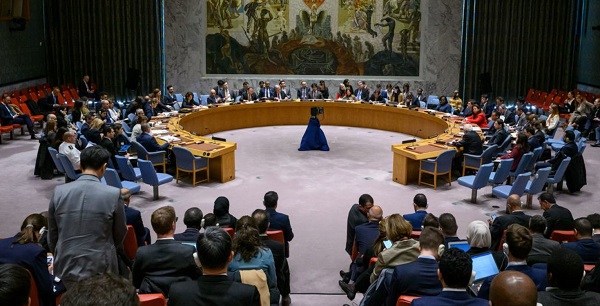
US blocks UN Security Council demand for humanitarian ceasefire in Gaza backed by Ghana and 12 other countries
The United States on Friday vetoed a proposed United Nations Security Council demand for an immediate humanitarian ceasefire in the war between Israel and Palestinian militant group Hamas in Gaza.
Thirteen other members including Ghana voted in favour of a brief draft resolution, put forward by the United Arab Emirates, while Britain abstained. The remaining countries were permanent UN security council members; China, France and the Russian Federation as well as non-permanent members; Ghana, Albania, Brazil, Ecuador, Gabon, Japan, Malta, Mozambique, Switzerland and the United Arab Emirates.
The vote came after U.N. Secretary-General Antonio Guterres made a rare move on Wednesday to formally warn the 15-member council of a global threat from the two-month-long war.
"What is the message we are sending Palestinians if we cannot unite behind a call to halt the relentless bombardment of Gaza?" Deputy UAE U.N. Ambassador Mohamed Abushahab asked the council. "Indeed, what is the message we are sending civilians across the world who may find themselves in similar situations?"
The United States and Israel oppose a ceasefire because they believe it would only benefit Hamas. Washington instead supports pauses in fighting to protect civilians and allow the release of hostages taken by Hamas in a deadly Oct. 7 attack on Israel.
Deputy U.S. Ambassador to the U.N. Robert Wood told the council that the draft resolution was a rushed, imbalanced text "that was divorced from reality, that would not move the needle forward on the ground in any concrete way."
"We do not support this resolution's call for an unsustainable ceasefire that will only plant the seeds for the next war," said Wood.
The U.S. had offered substantial amendments to the draft, including a condemnation of the Oct. 7 Hamas attacks that Israel says killed 1,200 people and in which 240 people were taken hostage.
Britain's U.N. Ambassador Barbara Woodward said her country abstained because there was no condemnation of Hamas.
"Israel needs to be able to address the threat posed by Hamas and it needs to do so in a manner that abides by international humanitarian law so that such an attack can never be carried out again," she told the council.
Palestinian U.N. envoy Riyad Mansour told the council the result of the vote was "disastrous," adding: "Millions of Palestinian lives hang in the balance. Every single one of them is sacred, worth saving."
Israel's U.N. Ambassador Gilad Erdan did not address the Security Council after the vote, but in a statement said: "A ceasefire will be possible only with the return of all the hostages and the destruction of Hamas."
The United States favors its own diplomacy over Security Council action to win the release of more hostages and press Israel to better protect civilians in Gaza as it retaliates against Hamas.
However, U.S. Secretary of State Antony Blinken acknowledged on Thursday that there was a "gap" between Israel's intent to protect civilians and what has happened on the ground. Gaza's Health Ministry says more than 17,480 people have been killed.
Israel has bombarded Gaza from the air, imposed a siege and launched a ground offensive. The vast majority of the Palestinian enclave's 2.3 million people have been driven from their homes.
"There is no effective protection of civilians," Guterres told the council earlier on Friday. "The people of Gaza are being told to move like human pinballs – ricocheting between ever-smaller slivers of the south, without any of the basics for survival. But nowhere in Gaza is safe."
A seven-day pause - during which Hamas released some hostages and there was an increase in badly needed humanitarian aid to Gaza - ended on Dec. 1.
After several failed attempts to take action, the Security Council last month called for pauses in fighting to allow aid access to Gaza, which Guterres on Friday described as a "spiralling humanitarian nightmare."
